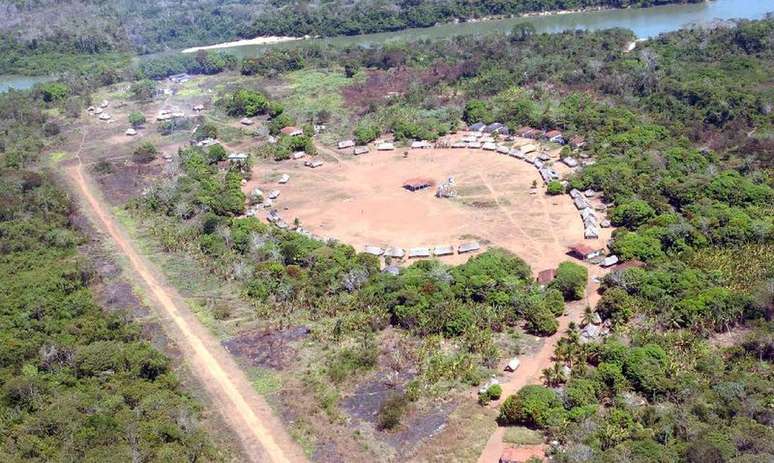Timing approval is what most concerns the organization
The United Nations (UN) Human Rights Office in South America expressed, this Monday (29), concern about the projects of the National Congress that could affect indigenous causes and has charged the Brazilian authorities with “urgent measures in favor of these populations, in accordance with international human rights standards”.
According to the UN, the legislative initiatives of the National Congress “risk of weakening the protection of indigenous peoples in Brazil”.
The greatest concern of the UN concerns the approval of the urgent request for a vote on the bill (PL) 490, which intends to establish a timetable for the delimitation of indigenous lands. According to the proposal, which is expected to be voted on Tuesday (30), only indigenous lands that were traditionally occupied by these peoples on the date of promulgation of the Federal Constitution, October 5, 1988, will be demarcated.
On the 24th of this month, the urgency of the vote on PL 490 was approved, which accelerated the drafting of the bill. If approved by the House, the bill goes to the Senate.
“The approval of the project known as the Temporal Framework would be a major setback for the rights of indigenous peoples in Brazil, contrary to international human rights standards,” said the UN human rights chief in South America, Jan Jarab. “The land ownership existing in 1988, after the expansionism of the military dictatorship, does not represent the traditional relationship forged over the centuries by peoples with their environment, arbitrarily ignoring their territorial rights and the ancestral value of the land for their ways of life .” Jarab added, in a footnote.
In November 2021, the United Nations Human Rights Commission had already warned Congress that such a bill is incompatible with international human rights standards.
Another concern of the UN Human Rights Office is the withdrawal of responsibilities from the ministries of indigenous peoples and environment and climate change.
“The Brazilian Parliament has a fundamental responsibility to promote and protect human rights. Therefore, it must evaluate any measures related to indigenous peoples and the environment in order to strengthen the country’s capacities to protect these rights and to combat the impacts of climate change and deforestation,” said Jan Jarab.
Human rights
The international organization Human Rights Watch has also expressed concern over the timing of the vote. In a statement, the organization says that the Brazilian Congress should reject a bill that adopts an arbitrary term for the recognition of indigenous lands.
“The right of indigenous peoples to their territories does not begin or end on an arbitrary date,” said the director of Human Rights Watch in Brazil. Maria Laura Canineu. “Passing this bill would be an inconceivable setback, it would violate human rights and signal that Brazil is not honoring its commitment to stand up for those who have proven to best protect our forests,” she said. .
For the organization, the approval of the urgency for the vote was a ploy by deputies to try to “influence a long-awaited decision of the Federal Supreme Court (STF) on timing”. This is because the STF has scheduled the resumption of judging times for June 7th.
The thesis on timing emerged in 2009, in an opinion of the Attorney General’s Office (AGU) on the delimitation of the Raposa Serra do Sol reserve, in Roraima, in which the criterion was used.
Currently, the STF is discussing the issue due to the Ibirama-Laklãnõ indigenous land dispute. Part of the 80,000-square-metre (m²) area occupied by the Xokleng indigenous people is being challenged by the Santa Catarina government. The state maintains that as of the effective date of the Constitution, there was no occupation in the area. The natives, on the other hand, maintain that, on that occasion, they had been expelled from the place.
On June 7, the court will analyze whether the time frame is valid across the country, which will reach more than 80 similar cases and more than 300 pending trials for the delimitation of indigenous lands.
For Human Rights Watch, the current government, despite its pledge to protect indigenous rights and the environment, “sent mixed signals about the timing. While the Minister of Indigenous Peoples and the President of Funai vehemently reject it, the Agriculture Minister said he was in favor during an interview, and the Union Attorney General has not yet revoked his 2017 opinion,” says the organization in a note .
“The rights of indigenous peoples are at risk,” said Maria Laura. “President Lula and his ministers should vehemently and unequivocally oppose any arbitrary attempt to prevent the demarcation of indigenous lands. The Advocate General of the Union should also play his part by immediately revoking the opinion of 2017 and defending the rights of indigenous peoples ».
The organization points out that uncertainty about demarcation makes territories particularly vulnerable to invasion by land grabbers and miners, generating conflicts over tenure and violence against indigenous peoples. According to the organization, the choice of an arbitrary timing violates international standards on the matter.
religious entities
The Interreligious Initiative for Tropical Forests (IRI Brasil), present in countries such as Brazil, Colombia, Peru, the Republic of Congo and Indonesia, informed that this Sunday (28) it had sent a letter to the National Congress in which it defends the rights of indigenous peoples and demonstrates against the approval of the bill.
In the document, sent to all federal deputies, the religious organizations underline that, “instead of ‘improving indigenous legislation’, as their defenders claim, the aforementioned bills seriously damage the country’s indigenous populations”.
The letter was signed by the National Council of Christian Churches in Brazil; by the Evangelical Christian Alliance; by the Israeli Confederation of Brazil; from Religions for Peace Brazil; from the Pan-Amazon Ecclesial Network; by the Laudato Si’ Movement; from the Popular Advocacy Christian Network; by the Evangelical Movement Against Time; by the United Religions Initiative; and the Interfaith Rainforest Initiative.
Editing: Nadia Franco
Source: Terra
Rose James is a Gossipify movie and series reviewer known for her in-depth analysis and unique perspective on the latest releases. With a background in film studies, she provides engaging and informative reviews, and keeps readers up to date with industry trends and emerging talents.







